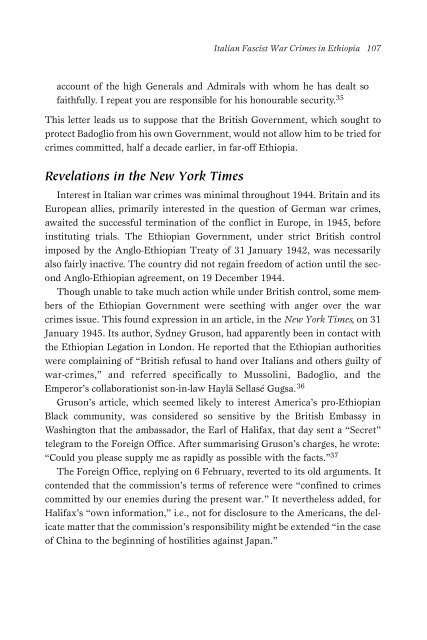Italian Fascist War Crimes in Ethiopia - Societa italiana di storia ...
Italian Fascist War Crimes in Ethiopia - Societa italiana di storia ...
Italian Fascist War Crimes in Ethiopia - Societa italiana di storia ...
Create successful ePaper yourself
Turn your PDF publications into a flip-book with our unique Google optimized e-Paper software.
<strong>Italian</strong> <strong>Fascist</strong> <strong>War</strong> <strong>Crimes</strong> <strong>in</strong> <strong>Ethiopia</strong> 107<br />
account of the high Generals and Ad m i rals with whom he has dealt so<br />
f a i t h f u l l y. I repeat you are responsible for his honourable security. 3 5<br />
This letter leads us to suppose that the British Government, which sought to<br />
protect Badoglio from his own Government, would not allow him to be tried for<br />
crimes committed, half a decade earlier, <strong>in</strong> far-off <strong>Ethiopia</strong>.<br />
Revelations <strong>in</strong> the New York Times<br />
Interest <strong>in</strong> <strong>Italian</strong> war crimes was m<strong>in</strong>imal throughout 1944. Brita<strong>in</strong> and its<br />
European allies, primarily <strong>in</strong>terested <strong>in</strong> the question of German war crimes,<br />
awaited the successful term<strong>in</strong>ation of the conflict <strong>in</strong> Europe, <strong>in</strong> 1945, before<br />
<strong>in</strong>stitut<strong>in</strong>g trials. The <strong>Ethiopia</strong>n Government, under strict British control<br />
imposed by the Anglo-<strong>Ethiopia</strong>n Treaty of 31 January 1942, was necessarily<br />
also fairly <strong>in</strong>active. The country <strong>di</strong>d not rega<strong>in</strong> freedom of action until the second<br />
Anglo-<strong>Ethiopia</strong>n agreement, on 19 December 1944.<br />
Though unable to take much action while under British control, some members<br />
of the <strong>Ethiopia</strong>n Government were seeth<strong>in</strong>g with anger over the war<br />
crimes issue. This found expression <strong>in</strong> an article, <strong>in</strong> the New York Times, on 31<br />
January 1945. Its author, Sydney Gruson, had apparently been <strong>in</strong> contact with<br />
the <strong>Ethiopia</strong>n Legation <strong>in</strong> London. He reported that the <strong>Ethiopia</strong>n authorities<br />
were compla<strong>in</strong><strong>in</strong>g of “British refusal to hand over <strong>Italian</strong>s and others guilty of<br />
war-crimes,” and re f e r red specifically to Mussol<strong>in</strong>i, Badoglio, and the<br />
Emperor’s collaborationist son-<strong>in</strong>-law Haylä Sellasé Gugsa. 36<br />
Gruson’s article, which seemed likely to <strong>in</strong>terest America’s pro-<strong>Ethiopia</strong>n<br />
Black community, was considered so sensitive by the British Embassy <strong>in</strong><br />
Wash<strong>in</strong>gton that the ambassador, the Earl of Halifax, that day sent a “Secret”<br />
telegram to the Foreign Office. After summaris<strong>in</strong>g Gruson’s charges, he wrote:<br />
“Could you please supply me as rapidly as possible with the facts.” 37<br />
The Foreign Office, reply<strong>in</strong>g on 6 February, reverted to its old arguments. It<br />
contended that the commission’s terms of reference were “conf<strong>in</strong>ed to crimes<br />
committed by our enemies dur<strong>in</strong>g the present war.” It nevertheless added, for<br />
Halifax’s “own <strong>in</strong>formation,” i.e., not for <strong>di</strong>sclosure to the Americans, the delicate<br />
matter that the commission’s responsibility might be extended “<strong>in</strong> the case<br />
of Ch<strong>in</strong>a to the beg<strong>in</strong>n<strong>in</strong>g of hostilities aga<strong>in</strong>st Japan.”

















